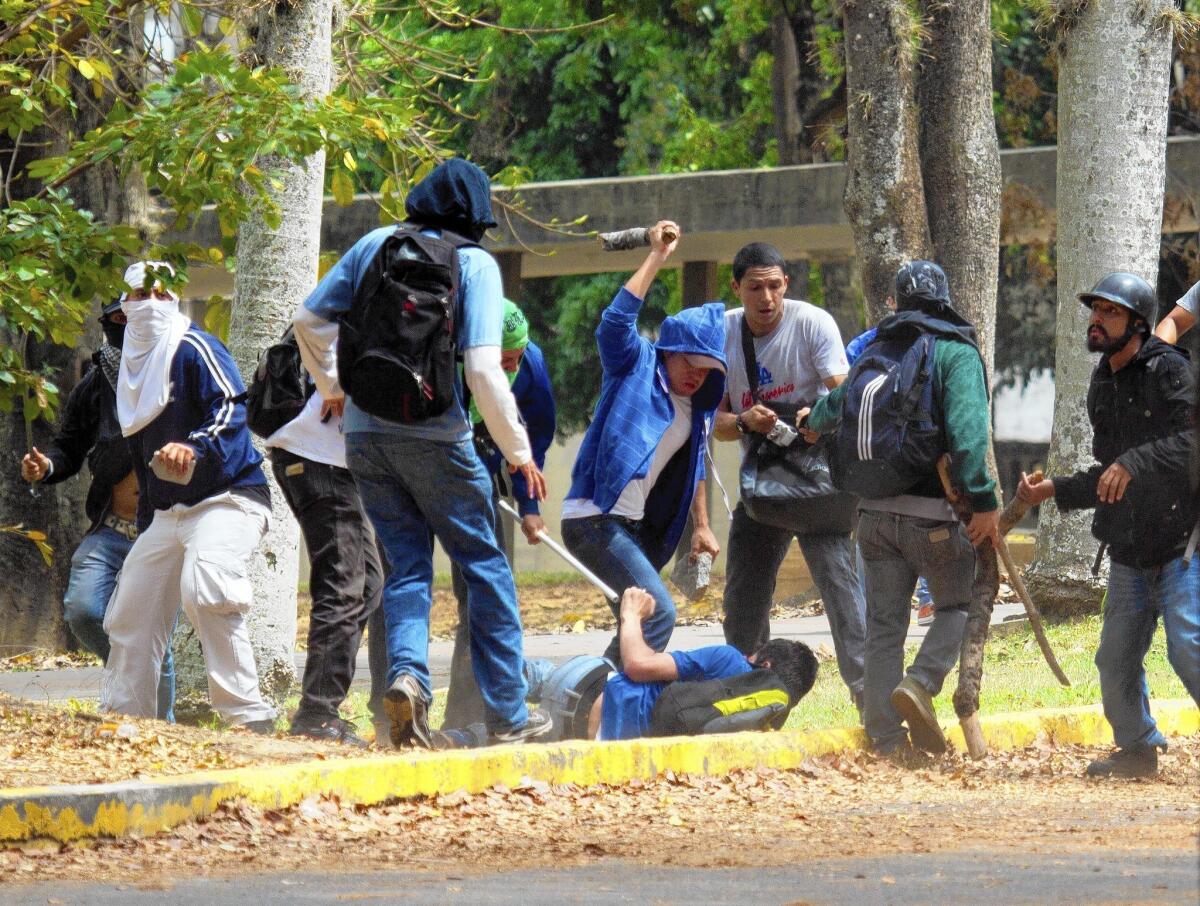Venezuela university officials decry attacks on students

- Share via
CARACAS, Venezuela — Officials at Venezuela’s largest university called on President Nicolas Maduro on Friday to help protect students after masked pro-government vigilantes attacked a peaceful gathering on campus and injured seven people.
Victor Marquez, president of the faculty association at the Central University of Venezuela in Caracas, said the attack Thursday on a group of about 1,200 students was carried out by men armed with metal pipes and wooden rods as national guard members stood by. Witnesses said the assailants also had pistols, but no shots were fired.
Students held a march Friday afternoon to protest the attacks, which Marquez and other university officials described as an attempt to intimidate government opponents.
Marquez said the campus had been invaded by motorcycle-riding vigilantes at least 10 times since student-led protests began sweeping the country in early February. The university, which was founded in 1721, has become a rallying point for students and others to protest Venezuela’s high crime rate, food shortages and struggling economy.
“The problems we are experiencing stem from a government policy of not allowing peaceful public protests,” Marquez said. “We have had several students and professors arrested for exercising their rights.”
On March 14, a group of 16 masked men entered the university’s science building and beat several students, witnesses say, provoking university Rector Cecilia Garcia Arocha to demand that pro-government forces stop “attacks on our university.”
Five days later, vigilantes attacked and robbed 11 students in the architecture building, forcing several to disrobe.
The Democratic Unity coalition of opposition parties issued a statement Thursday condemning the government for allowing the vigilante groups to attack students as part of a “new practice” to suppress protest.
The 48,000-student university, known by its Spanish initials UCV, has its own police force but it has proved unwilling or unable to stop the vigilantes, Marquez said. On March 14, the university fired its security chief and his deputy. The university has a special autonomous status, and government law enforcement units are forbidden to enter the campus.
Marches and clashes have continued in several cities across Venezuela. On Friday, Atty. Gen. Luisa Ortega Diaz said the death toll from nearly two months of protests stood at 39, including 31 civilians and eight members of the armed forces.
She also said that Leopoldo Lopez, a former mayor of a Caracas borough, would face formal charges of incitement to violence, criminal association and property damage for his role in leading initial protests in February. If convicted, Lopez could be sentenced to up to 10 years in prison.
The arrest of Lopez on Feb. 18 has been widely criticized by human rights groups as an infringement of the freedom of expression. Opposition National Assembly member Maria Corina Machado lost her membership in the legislative body last week and is also facing charges of incitement to violence.
On Wednesday , the head of Venezuela’s Roman Catholic bishops, Archbishop Diego Padron, issued the group’s harshest criticism of Maduro to date, saying the president aimed to impose a “totalitarian government” on Venezuelans. The comments came days after Maduro said he would be open to mediation by the Vatican to help negotiate peace between government supporters and protesters.
“The government is wrong to try to resolve the crisis with force,” Padron said in a statement. “Repression is not the way.”
Special correspondents Mogollon and Kraul reported from Caracas and Bogota, Colombia, respectively.
More to Read
Sign up for Essential California
The most important California stories and recommendations in your inbox every morning.
You may occasionally receive promotional content from the Los Angeles Times.










